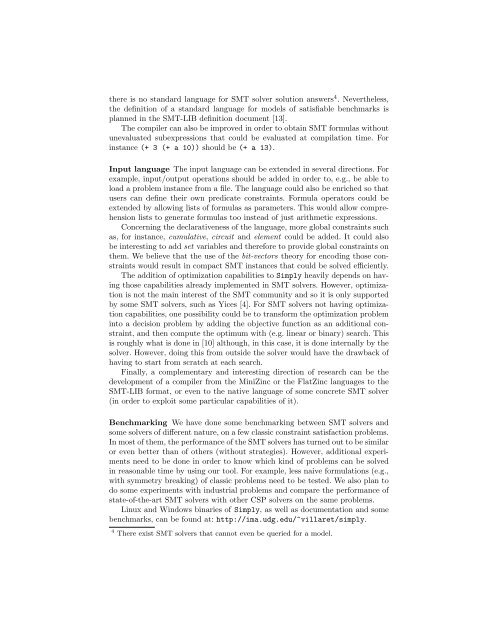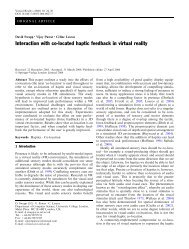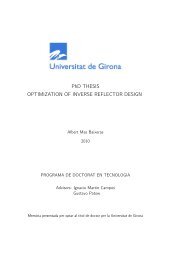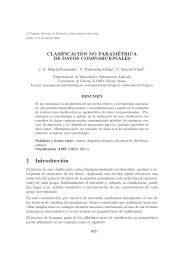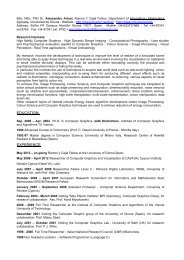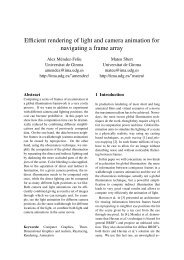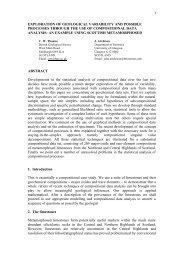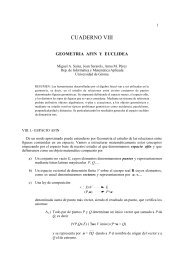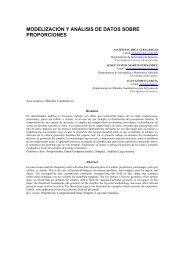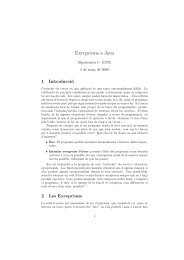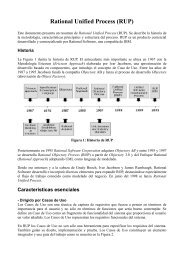SIMPLY: a Compiler from a CSP Modeling Language to the SMT-LIB ...
SIMPLY: a Compiler from a CSP Modeling Language to the SMT-LIB ...
SIMPLY: a Compiler from a CSP Modeling Language to the SMT-LIB ...
Create successful ePaper yourself
Turn your PDF publications into a flip-book with our unique Google optimized e-Paper software.
<strong>the</strong>re is no standard language for <strong>SMT</strong> solver solution answers 4 . Never<strong>the</strong>less,<strong>the</strong> definition of a standard language for models of satisfiable benchmarks isplanned in <strong>the</strong> <strong>SMT</strong>-<strong>LIB</strong> definition document [13].The compiler can also be improved in order <strong>to</strong> obtain <strong>SMT</strong> formulas withoutunevaluated subexpressions that could be evaluated at compilation time. Forinstance (+ 3 (+ a 10)) should be (+ a 13).Input language The input language can be extended in several directions. Forexample, input/output operations should be added in order <strong>to</strong>, e.g., be able <strong>to</strong>load a problem instance <strong>from</strong> a file. The language could also be enriched so thatusers can define <strong>the</strong>ir own predicate constraints. Formula opera<strong>to</strong>rs could beextended by allowing lists of formulas as parameters. This would allow comprehensionlists <strong>to</strong> generate formulas <strong>to</strong>o instead of just arithmetic expressions.Concerning <strong>the</strong> declarativeness of <strong>the</strong> language, more global constraints suchas, for instance, cumulative, circuit and element could be added. It could alsobe interesting <strong>to</strong> add set variables and <strong>the</strong>refore <strong>to</strong> provide global constraints on<strong>the</strong>m. We believe that <strong>the</strong> use of <strong>the</strong> bit-vec<strong>to</strong>rs <strong>the</strong>ory for encoding those constraintswould result in compact <strong>SMT</strong> instances that could be solved efficiently.The addition of optimization capabilities <strong>to</strong> Simply heavily depends on havingthose capabilities already implemented in <strong>SMT</strong> solvers. However, optimizationis not <strong>the</strong> main interest of <strong>the</strong> <strong>SMT</strong> community and so it is only supportedby some <strong>SMT</strong> solvers, such as Yices [4]. For <strong>SMT</strong> solvers not having optimizationcapabilities, one possibility could be <strong>to</strong> transform <strong>the</strong> optimization problemin<strong>to</strong> a decision problem by adding <strong>the</strong> objective function as an additional constraint,and <strong>the</strong>n compute <strong>the</strong> optimum with (e.g. linear or binary) search. Thisis roughly what is done in [10] although, in this case, it is done internally by <strong>the</strong>solver. However, doing this <strong>from</strong> outside <strong>the</strong> solver would have <strong>the</strong> drawback ofhaving <strong>to</strong> start <strong>from</strong> scratch at each search.Finally, a complementary and interesting direction of research can be <strong>the</strong>development of a compiler <strong>from</strong> <strong>the</strong> MiniZinc or <strong>the</strong> FlatZinc languages <strong>to</strong> <strong>the</strong><strong>SMT</strong>-<strong>LIB</strong> format, or even <strong>to</strong> <strong>the</strong> native language of some concrete <strong>SMT</strong> solver(in order <strong>to</strong> exploit some particular capabilities of it).Benchmarking We have done some benchmarking between <strong>SMT</strong> solvers andsome solvers of different nature, on a few classic constraint satisfaction problems.In most of <strong>the</strong>m, <strong>the</strong> performance of <strong>the</strong> <strong>SMT</strong> solvers has turned out <strong>to</strong> be similaror even better than of o<strong>the</strong>rs (without strategies). However, additional experimentsneed <strong>to</strong> be done in order <strong>to</strong> know which kind of problems can be solvedin reasonable time by using our <strong>to</strong>ol. For example, less naive formulations (e.g.,with symmetry breaking) of classic problems need <strong>to</strong> be tested. We also plan <strong>to</strong>do some experiments with industrial problems and compare <strong>the</strong> performance ofstate-of-<strong>the</strong>-art <strong>SMT</strong> solvers with o<strong>the</strong>r <strong>CSP</strong> solvers on <strong>the</strong> same problems.Linux and Windows binaries of Simply, as well as documentation and somebenchmarks, can be found at: http://ima.udg.edu/~villaret/simply.4 There exist <strong>SMT</strong> solvers that cannot even be queried for a model.


